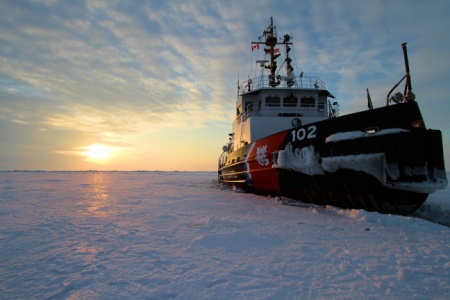The following is the text of a news release from the U.S. Coast Guard:
(DETROIT) — U.S. and Canadian Coast Guard icebreaking crews kick off Operation Coal Shovel on Friday in the waters of the southern Great Lakes.
Operation Coal Shovel encompasses domestic icebreaking operations in southern Lake Huron, Lake St. Clair, the St. Clair/Detroit River system, Lake Erie, Lake Ontario and the St. Lawrence Seaway.
U.S. and Canadian Coast Guard icebreakers work together to break ice in these waterways as conditions worsen throughout the winter.
The Coast Guard conducts domestic icebreaking operations for the purposes of search and rescue and other operations, such as flood mitigation and the facilitation of navigation, to meet the reasonable demands of commerce. The Coast Guard also provides flood mitigation assistance, as requested from the U.S. Army Corps of Engineers.
Other ice-related emergency operations include opening channels to icebound communities or breaking ice for the ferries that serve them in order to ensure critical supplies of food, heating oil or access to medical assistance is maintained.
The past two winters presented particularly harsh ice conditions on the Great Lakes. In 2015, Operation Coal Shovel started on Jan. 8 and ended on April 17, for a total of 100 days during which U.S. and Canadian icebreakers performed 2,400 hours of operations to support more than 150 commercial vessel transits.
Operation Taconite, another Coast Guard icebreaking operation that takes place in Lake Superior, Lake Michigan and northern Lake Huron, lasted for 122 days. The U.S. and Canadian Coast Guard played a vital role in facilitating the movement of iron ore, coal, salt, limestone, oil derivatives, cement and other cargoes during that time.
Coast Guard Sector Detroit provides command and control for Coal Shovel, and may place restrictions or close waterways as ice conditions dictate. Due consideration is given to the need for cross-channel traffic, such as ferries, the availability of icebreakers, and the safety of the island residents who use natural ice bridges for traveling to and from the mainland.
As the 2016 Operation Coal Shovel season begins, Sector Detroit and the Canadian Coast Guard will continue to monitor potential hazardous ice conditions and conduct icebreaking operations throughout the Great Lakes. Phone conferences are conducted regularly with maritime shipping company representatives to coordinate icebreaking services and facilitate the movement of commercial vessels.
The Coast Guard recommends all recreational ice users plan their activities carefully, use caution on the ice, and stay away from shipping channels. Waterway users and island residents should stay tuned to local media resources for the status of channel closures.
To report a person in distress or the need for search and rescue, contact the U.S. Coast Guard Sector Detroit Operations Center 24 hours a day at (313) 568-9560.

